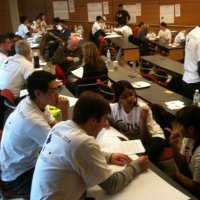Submitted by auerbach on

I have the pleasure and privilege of sitting in on iCons I: Global Challenges/Scientific Solutions, every Tuesday and Thursday. This past Thursday (February 10, 2011) the discussion gave me a new appreciation of team work in particular, and of the goals of iCons in general.
To set the stage -- the class was working on mathematical algorithms that model the spread of cholera in Haiti. This is a heady subject to be sure, requiring skill in algorithm development and model building. It is precisely this kind of challenging project that we anticipate will forge teams from groups of students. What is a team anyway? A quick Google search answers: "a group of people linked by a common purpose." Modeling the spread of cholera in Haiti provides this common purpose.
What are the elements of a good team for solving this problem? When I posed this question to an iCons student, I received the following answer: "We all have our jobs. Some people are good at asking questions about cholera, other people are good at making assumptions that simplify the model, and others are good at coding the model. In the end we just want to solve the problem." This student was describing epidemiology, model building, and software development -- three very different skills needed for this project.
This was a revealing answer because it taught me about team work and the overall objectives of iCons. Most courses and/or programs aim to deliver the same content to all its students, like filling Halloween buckets with exactly the same candy. iCons is different. In iCons teams, each student plays a different role, honing different concrete skills according to her/his interests, getting the Halloween candy she/he likes the most. The meta-skills all iCons students develop are effective team work and communication across disciplines. These meta-skills are like the Halloween bucket itself.
So what makes a team successful? A recent op-ed piece in the Boston Globe [1] suggests that it is not the average IQ of the team, nor the IQ of its smartest member, but rather the culture of a team that allows people to express their ideas without fear of reprisal.
I interpret this to mean that successful teams focus on their task, consider all possible pathways to task completion, and remain unattached to any particular pathway. "In the end, we just want to solve the problem."
I only wish all teams could work as well as our iCons student teams.
[1] Johnson, Carolyn Y. "Group IQ." The Boston Globe 19 Dec. 2010.
Stay Connected